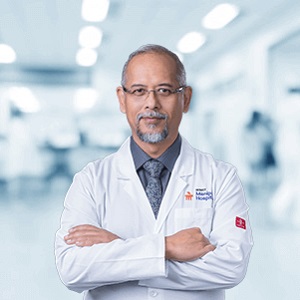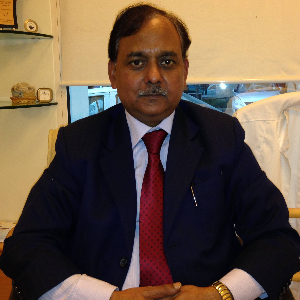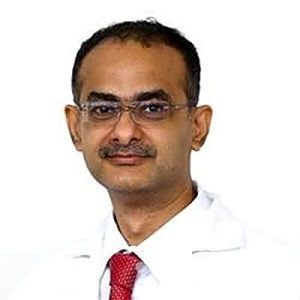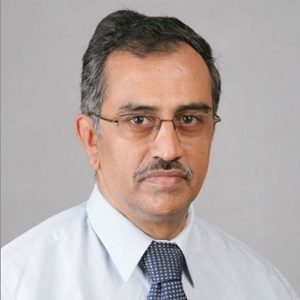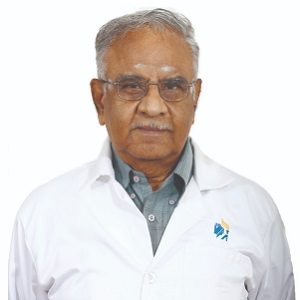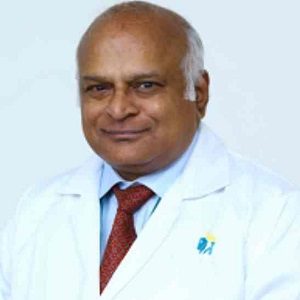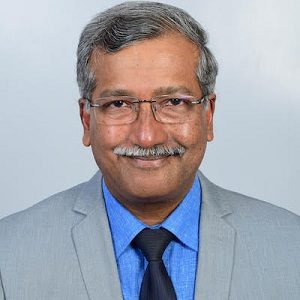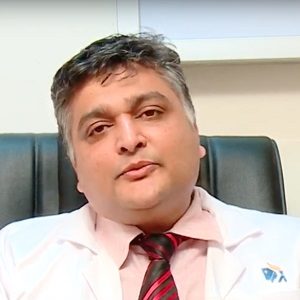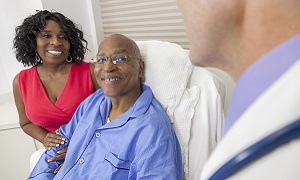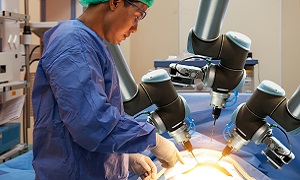Best Doctors in India for Prostatectomy
- Urologist, New Delhi, India
- Over 20 years’ experience
Profile Highlights:
- Dr. Sanjay Gogoi is a renowned Urologist with over 20 years of experience, He is an expert in minimally invasive transplant techniques of Laparoscopic and Robotic-Assisted Transplantation.
- He is also trained in Robotic surgery at da Vinci Training Center, Intuitive Surgical, California. With over six years of experience in doing Robotic Cancer surgeries on the Kidney, Bladder, Prostate, Adrenal, etc., Dr. Sanjay Gogoi is an expert in Robotic reconstructive procedures of kidneys, ureters, and bladder, as well, as in adults as well as pediatric patients.
- Urologist, New Delhi, India
- Over 35 years’ experience
Profile Highlights:
- Dr. Anant Kumar is one of the finest urology and kidney transplant doctors in India.
- Dr. Kumar specializes in Kidney Transplantation, Robotic Assisted Laparoscopic Urology, Renovascular Hypertension, Laparoscopic Urology, Urological Oncology, Laser Urological Surgery, and Reconstructive Urology.
- He has performed over 3500 kidney transplants and over 2000 lap donor nephrectomy procedures over the span of 3 decades.
- Nephrologist, Gurugram, India
- Over 15 years’ experience
Profile Highlights:
- Known as one of the best nephrologists in the NCR region, Dr. Manish Jain holds a special interest in renal transplants as well as clinical nephrology.
- His compassionate patient care and lifestyle advocacy have helped patients recover from various disorders.
- Throughout his career, Dr. Manish Jain has published several papers in India and is also a member of several medical associations.
- Urologist, Chennai, India
- Over 15 years’ experience
Profile Highlights:
- Dr. Deepak Raghavan is a renowned urologist who has gained immense fame and praise in the few years of his career.
- He is specially trained in Robotic Surgery, the need of the hour for Urology patients.
- Pediatric Urologist, Chennai, India
- Over 25 years’ experience
Profile Highlights:
- Dr. Sripathi is a renowned surgeon with 25 years of experience in the field of Pediatric Urology.
- Dr. V Sripathi qualified for the award of the “Fellowship of the Royal Australasian College of Surgeons” (FRACS) after working in Perth and Melbourne, Australia.
- He completed his Pediatric Urology training with a brief stint at the King Faisal Specialist Hospital & Research Center in Riyadh, specializing in advanced Reconstructive Urology.
- Urologist, Chennai, India
- Over 45 years’ experience
Profile Highlights:
- Dr. Duraisamy S is one of the best Urology surgeons and General physicians in South India with more than 45 years of experience.
- Dr. Duraisamy considers his profession a special mission, a devotion that calls for involvement, respect, and willingness to help others.
- He published several papers on UTI, uterovaginal fistula, ureteric diverticulum, and Endoscopy in reputed medical periodicals.
- Urologist, Chennai, India
- Over 39 years’ experience
Profile Highlights:
- Dr. Murali Venkatraman is a Senior Urologist from India with vast experience.
- Being a fellowship holder in Laparoscopic Urology, he specializes in Laparoscopic Urology.
- Dr. Venkataraman is serving for the last 39 years and has received many awards and recognitions for his contribution.
- Urologist, Chennai, India
- Over 37 years’ experience
Profile Highlights:
- Dr. Thirumalai Ganesan Govindasamy is a well-known Urologist of India.
- He has interests and specializations in Laparoscopic and Robotic Urology, Robotic and Laparoscopic Donor Nephrectomy, Urethral Reconstructive Surgery, Per-cutaneous Nephrolithotomy, and Flexible Ureteroscopy.
- Serving his patients for almost 37 years, Dr. Govindasamy has gained enough recognition and trust from his patients and has cured many people of severe illnesses.
- Urologist, Chennai, India
- Over 21 years’ experience
Profile Highlights:
- Dr. Nitesh Jain is an experienced urologist in Tamil Nadu, having managed complex urological diseases.
- Dr. Nitesh has grabbed a gold medal in Surgery during MBBS and M.Ch Urology.
- Dr. Nitesh Jain also got training in robotic surgery from Roswell Park Cancer Institute, Buffalo, USA.
Best Hospitals in India for Prostatectomy
Fortis Hiranandani Hospital, Mumbai
- City: Mumbai, India
Hospital Highlights:
- Fortis Hiranandani hospital was established in 2007.
- The hospital is an advanced tertiary care, multi-specialty hospital equipped with 149 beds.
- The hospital is equipped with a super ICU to provide emergency medical care to critically ill patients.
- The hospital is NABH accredited.
- The critical care facility in the hospital is augmented with the state-of-the-art facilities that facilitate speedier diagnosis and efficient monitoring.
- The hospital provides specialty medical services in cardiology, orthopedic science, pediatric science, neurology, diabetic care, urology, nephrology, ENT, obstetrics, gynecology, cosmetic surgery, bariatric surgery, neuro and spine care.
Fortis Hospital, Anandpur, Kolkata
- City: Kolkata, India
Hospital Highlights:
- Fortis Hospital, Anandapur, Kolkata is a world-class super-speciality equipped with the latest technologies in the medical world.
- The hospital is NABH accredited.
- This state-of-the-art facility specializes in cardiology and cardiac surgery, urology, nephrology, neurosciences, orthopaedics, digestive care, emergency care and critical care.
- The hospital, governed by integrated Building Management System (IBMS), has a pneumatic chute system, for quick vertical and horizontal transportation between floors, facilitating speedy transfer of patient specimens, documents, reports, and medicines to the concerned departments.
- The hospital also has a nephrology department with over 28 advanced dialysis units.
Fortis Hospital Banerghatta, Bengaluru
- City: Bengaluru, India
Hospital Highlights:
- Fortis Hospital Bannerghatta, Bengaluru was established in 2006.
- The hospital is a 276 bedded multi-specialty tertiary care facility.
- The hospital specializes in cutting-edge medical technology and dedicated patient care services.
- The hospital is equipped with state-of-the-art technologies like trans-radial angioplasty, trans-abdominal cardiac surgery, and computerized TKR navigation surgery.
- The hospital provides specialty medical services in cardiology, cardiac surgery, orthopedics, neurology, neuro-surgery, GI, and Minimal Access Surgery (MAS).
Fortis Hospital, Malar, Chennai
- City: Chennai, India
Hospital Highlights:
- Fortis Malar was established in 1992 and was formerly known as Malar Hospital.
- The hospital specializes in cutting-edge medical technology and dedicated patient care services.
- The hospital is multi-specialty, tertiary care facility with 180 beds.
- The hospital offers comprehensive medical care in specialties such as cardiology, cardio-thoracic surgery, neurology, neurosurgery, orthopedics, nephrology, gynecology, gastroenterology, urology, pediatrics, and diabetes.
Gleneagles Global Hospital, Parel, Mumbai
- City: Mumbai, India
Hospital Highlights:
- Gleneagles Global Hospital The 450-bed facility comprises of 17-stories, housing state-of-the-art infrastructure, and advanced medical care facilities.
- The hospital offers end-to-end clinical, surgical, and diagnostic services. It is equipped with a team of eminent medical professionals aided by qualified nurses and medical staff
- The Hospital offers advanced Endoscopic procedures, Hepatobiliary and Liver Surgeries, Surgical and Medical Gastroenterology, Bariatric Surgery, and Robotic surgery.
- The hospital is a center of excellence for Orthopedics, Joint Replacement, Knee Replacement, and Hip Replacement surgery.
Manipal Hospital, Dwarka, Delhi
- City: New Delhi, India
Hospital Highlights:
- Manipal Hospitals, Dwarka, is a super-specialty hospital in Dwarka, New Delhi, which is a part of Manipal Hospitals Group.
- The hospital aims to provide the best treatment on par with international standards at a fraction of the cost.
- Equipped with 380 beds, the hospital is also one of the new age hospitals which are equipped fully with state-of-the-art infrastructure, cutting-edge technology as well as the latest and advanced clinical practices. The hospital also has 13 modular Operation theatres with 118 beds which are solely meant for critical care.
- The hospital comprises internationally acclaimed doctors and highly professional and experienced hospital and medical staff who are able to provide preventive, therapeutic, and diagnostic services all under one roof.
Paras Hospital, Gurugram
- City: Gurugram, India
Hospital Highlights:
- Paras hospital was established in 2006 and is the 250 bedded flagship hospital of Paras Healthcare.
- The is supported by a team of doctors of international and national repute.
- The hospital is NABH accredited and also the first hospital in the region to have a NABL accredited laboratory.
- The hospital provides specialty medical services in around 55 departments including Neurosciences, Joint Replacement, Mother & Child Care, Minimal Invasive Surgery, Gynecology and Obstetrics, Ophthalmology, Dermatology, Endocrinology, Rheumatology, Cosmetic and Plastic surgery.
- The hospital is equipped with state-of-the-art technologies.
S L Raheja Hospital, Mahim, Mumbai
- City: Mumbai, India
Hospital Highlights:
- SL Raheja hospital is a 140-bed multi-specialty tertiary care hospital that is being managed by Fortis Healthcare Ltd.
- The hospital is a benchmark in healthcare and medical facilities in the neighborhood of Mahim & the western suburbs.
- L.Raheja Hospital, Mahim has one of the most effective ICU and Casualty care services.
- The hospital provides specialty medical services in Cardiology, Oncology, Neurology, Orthopedics, Mother & Child Care, and in Diabetes.
Wockhardt Hospitals, Mumbai
- City: Mumbai, India
Hospital Highlights:
- Wockhardt Hospitals were established in the year 1973, originally called First Hospitals and Heart Institute.
- Wockhardt Hospitals are super specialty health care networks in India, nurtured by Wockhardt Ltd, India’s 5th largest Pharmaceutical and Healthcare company.
- Wockhardt Hospitals is associated with Partners Harvard Medical International, an international arm of Harvard Medical School, USA.
- Wockhardt Heart Hospital performed India’s first endoscopic heart surgery.
- The hospital has a state-of-the-art infrastructure equipped with the latest technologies and modern equipment.
- It has special Centers of Excellence dedicated to the major specialties to provide hassle-free and high-quality clinical care.
Pushpawati Singhania Hospital & Research Institute, New Delhi
- City: New Delhi, India
Hospital Highlights:
- Established in 1996, Pushpawati Singhania Research Institute is one of the top hospitals in the NCR region, as well as one of the top facilities in India for gastroenterology. The hospital is one of South Asia’s first institutes in medical and surgical treatment for diseases related to digestion.
- The hospital is equipped with state-of-the art facilities coupled with the latest equipment as well as renowned consultants from various parts of India as well as other parts of the world.
Prostatectomy
Prostatectomy is a procedure for removing part or all of the prostate gland. The prostate gland is responsible for carrying urine from the bladder to the penis. This gland is located in the male pelvis below the urinary bladder.
Depending on your situation, prostatectomy can be performed in many ways. Options generally include traditionally open surgery and minimally invasive surgery which is performed with robotic assistance.
This procedure is used for treating a number of conditions which affect the prostate. Generally, it is used as a treatment for prostate cancer.
Purpose
Prostatectomy is generally done for treating localized prostate cancer. It might be used alone or in combination with radiation, hormone therapy and chemotherapy.
Radical prostatectomy is a surgery for removing the entire prostate gland and surrounding lymph nodes. This is for treating men with localized prostate cancer. Different techniques can be used for performing a radical prostatectomy, some of which includes:
Robot-assisted radical prostatectomy- In this method, the surgeon makes five to six small incisions in your lower abdomen for removing the prostate. He or she sits at a console and uses instructions attached to a computer-assisted mechanical device. The robotic device can allow a more precise response to the movement of the surgeon’s hands.
Open radical prostatectomy- In this method, your surgeon generally makes an incision in your lower abdomen for removing the prostate.
Less often, simple prostatectomy might be recommended for men who suffer from severe urinary symptoms and enlarged prostate glands. Generally, simple prostatectomy is performed as a minimally invasive procedure using robotic assistance.
Before the procedure
Before your procedure, your doctor might want to do a test, which uses a visual scope for looking inside your urethra and bladder. It is important for your doctor to check the size of your prostate and examine your urinary system. Your doctor might also sometimes want to perform a few other tests.
It is important to let your doctor known about any medications or supplements that you might take. You might need to stop taking any blood-thinning medications and pain relievers such as aspirin.
It is also important to fast before the surgery, for at least 12 hours. You might also be given a kit and instruction so that you can give yourself an enema for clearing your bowels before the surgery.
It is important to avoid wearing items such as jewelry, eyeglasses, dentures or contact lenses. It is also important to ask your doctor how long you will be in the hospital. It is best if you are able to arrange a ride home in advance, as you won’t be able to drive for some time after the procedure.
It is also important to talk with your doctor regarding how much time will be required for recovery.
Procedure
This procedure is performed using general anesthesia. It means that you are asleep during the procedure. You might also be receiving an antibiotic right before the surgery to prevent an infection.
Robot-assisted radical prostatectomy
Robot-assisted radical prostatectomy: In this method, your surgeon sits at a remote-control console near you and the operating table. He/she precisely controls the motion of the surgical instruments with the aid of two hand-and-finger control devices. The console is able to display a magnified, 3D view of the surgical area which enables your surgeon to visualize the procedure in detail.
The robotic system allows smaller and precise incisions. This usually helps in faster recovery as compared to traditional surgery.
Open radical prostatectomy
Open radical prostatectomy: In this method, the surgeon will make an incision in the lower abdomen from below your navel to just above your pubic bone. Then he/she will be carefully dissecting the prostate gland from the surrounding nerves and blood vessels. Then the surgeon will remove the prostate along with its nearby tissues. After this, the incision will be closed with sutures.
Simple prostatectomy
In simple prostatectomy, first, your doctor might be inserting a long, flexible viewing scope, i.e. a cystoscope through the tip of your penis to see inside your bladder, bladder and prostate area. Your doctor will next insert a tube known as a Foley catheter into the tip of your penis that extends into your bladder. This is done to drain urine during the procedure. The location of incisions will depend on what technique is used by your doctor. If you also have a hernia or bladder problem, your doctor might repair it using the same surgery.
After your doctor has removed part of your prostate that causes your symptoms, one to two drain tubes might need insertion through punctures in your skin near your surgery site. These tubes are temporary. One tube will go directly into your bladder and the other tube will be going into the area where the prostate was removed i.e. pelvic drain.
After the procedure

After your procedure, you might receive pain medications from your doctor. You might be able to walk on the day of the surgery or after one day. It is important to do exercises to move your feet, while you are still in bed.
You can expect to go home one day after the surgery. Most men generally need a urinary catheter for around seven to ten days after surgery. Full recovery of urinary control might take up to a year after surgery.
In around four to six weeks, you should be able to resume your normal routine. It is also important for you to see your doctor a few times in order to make sure everything is okay. If you are going through any problems, you might need to see your doctor sooner.
If you undergo a simple prostatectomy, you may still be able to orgasm during sexual activities, but there might be little or no semen. After radical prostatectomy, it might take around 18 months for a full recovery of erectile function.
Risks
Both radical and simple prostatectomy carries few risks. The risks associated with radical prostatectomy include:
- Bleeding
- Urinary tract infection
- Narrowing of the urethra or bladder neck
- Urinary incontinence
- Formation of cysts containing lymph
- Erectile dysfunction
Risks associated with a simple prostatectomy include:
- Bleeding
- Dry orgasm
- Urinary tract infection
- Urinary incontinence
- Erectile dysfunction
- Narrowing of the urethra or bladder neck

